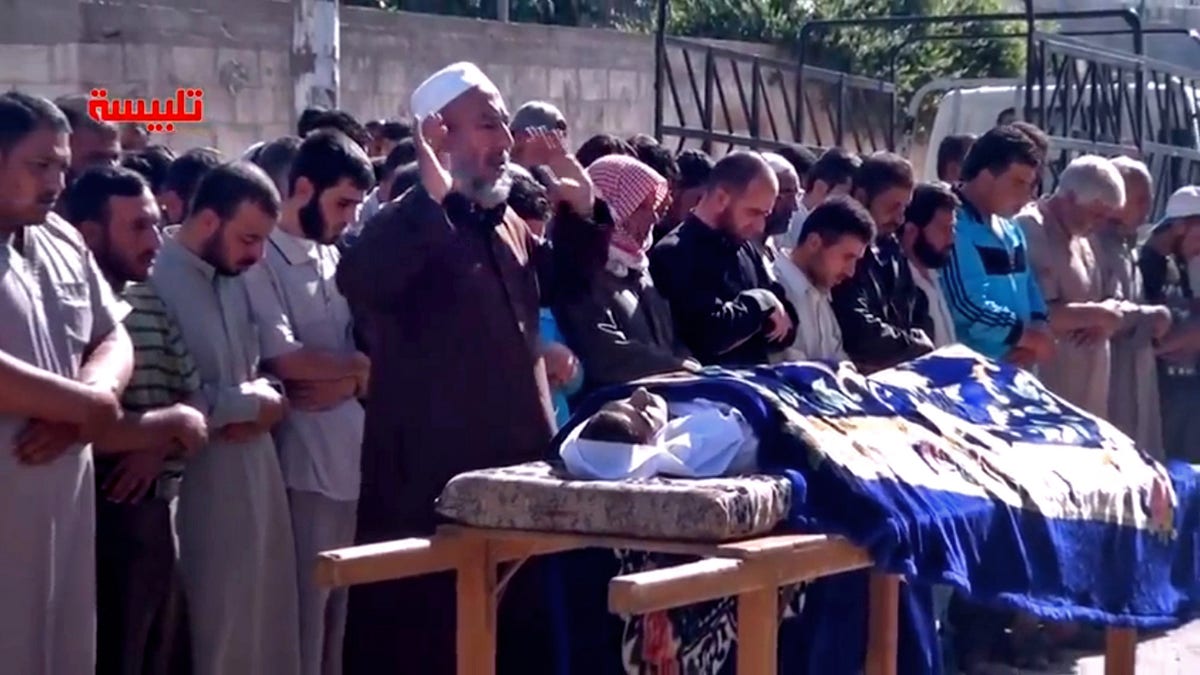
In this image taken from video obtained from the Shaam News Network, which has been authenticated based on its contents and other AP reporting, Syrians participate in the funeral prayer for Youssef Ghazi al-Sarmani who was killed in fighting between rebel and government forces, Monday, May 27, 2013. Logo in red reads, "Talbiseh". (AP Photo/Shaam News Network via AP video) (The Associated Press)
ISTANBUL – Gunmen killed three Lebanese soldiers in a drive-by shooting on a government checkpoint near the Syrian border Tuesday, Lebanon's military said, escalating tensions in a deeply divided country wary of being increasingly pulled into the civil war raging next door.
Gunmen fired on a Lebanese government checkpoint near the Syrian border on Tuesday, killing three soldiers, the Lebanese army said. The attack comes amid escalating tensions in Lebanon linked to Syria's conflict, in which rival Lebanese groups have taken sides.
The fighting in the volatile Lebanon-Syria border region also follows a European Union decision not to extend an arms embargo on Syria, enabling member states to send weapons to help Syria's outgunned rebels and step up the pressure on the government of President Bashar Assad to seek a negotiated settlement to the 26-month-old conflict.
A senior Syrian opposition member said Tuesday that the expiration of the embargo was "positive" but added that it would not impact the course of the conflict quickly enough.
The pre-dawn shooting in Lebanon took place at a roadblock near the predominantly Sunni town of Arsal, nestled in the hills about 12 kilometers (seven miles) from the border. The army said in a statement that gunmen fired on the checkpoint from a moving car. Troops have launched a massive search for the attackers.
The Lebanese are divided over Syria's civil war, with the Shiite militant group Hezbollah fighting alongside Assad's troops while large numbers of Sunnis have taken up arms to support the opposition.
Inside Lebanon, sporadic clashes have erupted between factions backing opposing sides in the Syrian conflict, most recently in the northern city of Tripoli, raising fears that the Syrian violence spilling over into Lebanon will re-ignite the sectarian war that devastated the country before it ended in 1990.
Tensions have soared since a Syrian government offensive in the town of Qusair near the Lebanese border. Hezbollah has backed the government in the battle, losing dozens of fighters.
On Sunday, two rockets hit Hezbollah's strongholds in south Beirut, wounding four people. The rocket attacks came a day after Hezbollah leader Hassan Nasrallah pledged to lift Assad to victory.
Hezbollah's growing role in the fighting has outraged the Syrian opposition, and a Syrian rebel commander heading to Qusair has threatened to retaliate against Hezbollah inside Lebanon.
In Brussels, EU member states decided late Monday to allow an arms embargo on Syria to expire on Saturday. While none of the block's 27 members has any immediate plans to send arms to the rebels, British Foreign Secretary William Hague said the decision "sends a very strong message from Europe to the Assad regime."
EU countries will individually examine their export license applications one by one and will not proceed "at this stage" with deliveries of military equipment, the joint declaration said, though it did not specify when that might change.
It is likely that many will wait until prospective "Geneva II" talks next month, part of a joint U.S.-Russia initiative to end the crisis. The EU's Monday decision is aimed at pressuring Damascus to take part in good faith.
The Syrian government said Sunday it agreed "in principle" to send delegates to Geneva. But members of the opposition's fractured Syrian National Coalition have been bogged down for days meeting in Turkey trying to come up with a unified position on the proposed peace talks as well as elect new leaders and expand membership.
Opposition figures said the EU decision to let the arms embargo expire is a positive step, but should have gone into effect immediately if it is aimed at helping the opposition topple the Assad regime.
"We think it is a positive move but we are afraid the delay of the lifting of the embargo until August will have negative effects on stopping the aggression and killing in Syria on the part of the regime," said Louay Safi, a senior member of the main opposition block.
Washington and many of its European allies have been reluctant to provide rebels with more sophisticated weapons for fear they might end up in the hands of the radical Islamic factions, including the al-Qaida-affiliated Jabhat al-Nusra, a group that has been the most effective fighting force on the opposition side.
But many in the United States would proceed despite those concerns. Sen. John McCain, a proponent of arming Syrian rebels and a fierce critic of Obama administration policy in Syria, crossed into Syrian territory on Monday to meet with anti-government fighters.
The conflict began in March 2011 as peaceful protests against Assad, whose family has ruled the country for more than 40 years. The uprising turned into a civil war after some opposition supporters took up arms to fight a brutal government crackdown on dissent.
More than 70,000 people have been killed and more than five million Syrians fled their homes, seeking shelter in neighboring countries or in other parts of Syria.
___
Associated Press writer Onur Cakir in Istanbul contributed to this report.
